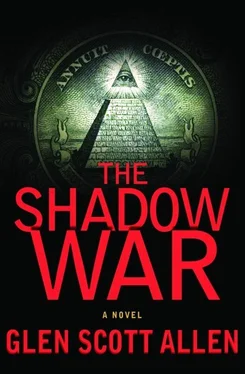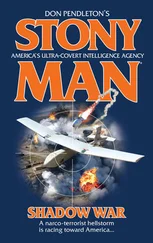Glen Allen - The shadow war
Здесь есть возможность читать онлайн «Glen Allen - The shadow war» весь текст электронной книги совершенно бесплатно (целиком полную версию без сокращений). В некоторых случаях можно слушать аудио, скачать через торрент в формате fb2 и присутствует краткое содержание. Жанр: Триллер, на английском языке. Описание произведения, (предисловие) а так же отзывы посетителей доступны на портале библиотеки ЛибКат.
- Название:The shadow war
- Автор:
- Жанр:
- Год:неизвестен
- ISBN:нет данных
- Рейтинг книги:5 / 5. Голосов: 1
-
Избранное:Добавить в избранное
- Отзывы:
-
Ваша оценка:
- 100
- 1
- 2
- 3
- 4
- 5
The shadow war: краткое содержание, описание и аннотация
Предлагаем к чтению аннотацию, описание, краткое содержание или предисловие (зависит от того, что написал сам автор книги «The shadow war»). Если вы не нашли необходимую информацию о книге — напишите в комментариях, мы постараемся отыскать её.
The shadow war — читать онлайн бесплатно полную книгу (весь текст) целиком
Ниже представлен текст книги, разбитый по страницам. Система сохранения места последней прочитанной страницы, позволяет с удобством читать онлайн бесплатно книгу «The shadow war», без необходимости каждый раз заново искать на чём Вы остановились. Поставьте закладку, и сможете в любой момент перейти на страницу, на которой закончили чтение.
Интервал:
Закладка:
CHAPTER 51
What woke Benjamin the second time was the smell of something cooking, something with beef and onions. He realized suddenly that he was quite hungry.
This time, it was easier to get out of bed and stand up. Boris was still snoring on the cot. Whatever they'd given him, he thought, it must have been a very enthusiastic dose, indeed.
He shuffled to the door, opened it, and went out into the other room.
Through the windows of Boris's cabin he could see it was pitch-black outside, and snow was still falling, now heavily. Inside, the fireplace was casting a warm glow, and there were several oil lanterns set around the room.
Natalya was huddled over the stove, Nikolai at her side. They were arguing about something-apparently the proper amount of spices for whatever they were cooking. Wolfe and Anton were sitting around the wooden table, hunched over a set of papers spread across its surface. As he entered the room, everyone looked up.
"He riseth," said Wolfe. "And looking a trifle sounder. I do believe Boris's vodka is magic after all."
Natalya left the stove, came over to him, guided him to a chair at the table.
"How do you feel?" she asked.
"I'm not sure," Benjamin answered. "I've never been shot before. How should I feel?"
She kissed him. "You're very strong," she said, "for an academician." Then she returned to the stove, leaving Benjamin to muse over the wondrous ambiguity of Russian compliments.
Benjamin looked down at the papers on the table, apparently the material that had been in Leverotov's box.
There was a typed manuscript, in Russian, and next to that a leather-bound journal. The journal was open. Benjamin could see handwriting-very neat, precise Cyrillic-and what appeared to be long lists of numbers.
"I assume that's Leverotov's journal," Benjamin said, pointing to the leather-bound book. "But what are those pages?"
"Ah," Anton said. He swept his hand over them, as if presenting Benjamin with a valuable work of art. "Let me introduce you. Is Stzenariy 55. "
"Then it exists!" said Benjamin.
"Sort of," said Wolfe, looking up from the pages. "Just not in the way anyone imagined."
"Sam, please," said Anton. "Boy is shot, is on drugs. Don't be coy."
Wolfe leaned back in his chair, stretched.
"Let me get something besides this wretched tea," he said, standing and going over to Boris's well-stocked shelves. He picked one of the bottles, took a glass, then returned to the table, poured one for himself, Anton, and Nikolai-but Benjamin declined; he wanted to stay conscious for a while this time-and then leaned forward, folding his arms on the table.
"Now, let me tell you about Vladimir Sergeyevitch Leverotov, one of the most brilliant people, other than Jeremy Fletcher, that I've never met."
Vladimir Sergeyevitch Leverotov (Wolfe began) joined 12 Directorate of the Soviet Ministry of Defense in 1959, when he was twenty-six-the youngest member of a very small and very elite group of young, brilliant, earnest thinkers; and their task it was to "think the unthinkable": how to prepare for and, if necessary, wage nuclear war against the "imperialist aggressors" in the United States.
As a math prodigy, Leverotov had always been fascinated by the relatively obscure field in mathematics known as game theory. He was among the first in the Soviet Union to read the work of John Nash, an American mathematician who would later become as famous for his bouts with schizophrenia as his radical theories of gaming strategy.
He and his colleagues at the directorate were given a daunting task: develop an operational plan that would neutralize the ten-to-one advantage in nuclear weapons enjoyed by the United States. They considered the usual ruses common to centuries of warfare: dummy weapons, fake military broadcasts, nonexistent battalions. But such measures seemed like quaint antiques in the modern age of ICBMs and supersonic bombers.
One day, while buried deep in the directorate's archives searching for ideas that might have been overlooked, Leverotov had come across a dusty report written six years earlier, immediately after the first successful test of Russia's hydrogen bomb-what they had called Kuzkin otets, the "Father of All Bombs." Apparently the report had been filed away and forgotten.
Its author was anonymous, and Vladimir soon discovered why: the report suggested that, with the coming of weapons so powerful that only a few dozen were needed to utterly destroy one's enemy, and the undeniable reality that one's enemy possessed the same weapons, the greatest threat to both sides would be fear: fear of what the other side might do, fear of secrets, fear of being caught by surprise. Since the official Party line was that the Soviet Union knew no fear, it was clear why the author didn't want "credit" for this idea.
The report went on to say that such fear was as strong, if not stronger, for the Americans than for the Soviets. The United States firmly believed that the chief lesson it had learned from World War II and Pearl Harbor was simple: never get caught with your pants down. This fear, the report suggested, would cause the United States to put enormous resources into sustaining a state of "permanent alert": bombers constantly in the air, missiles ready to fire… all of which would look quite provocative to the USSR, with its own "master fear" of being surrounded by enemies, all waiting to pounce.
Thus the two fears would fit one another perfectly, becoming a folie a deux, a "shared madness" that could only end in catastrophe.
The author of this report pointed out it took only crude statistical analysis to predict that, given all the opportunities such interlocking fears would generate for misunderstandings, it was a matter of a decade, perhaps less, before the two sides would unleash their arsenals, annihilating one another.
But the author of the report had no alternative to offer. He concluded that the best the USSR could do was to build weapons as fast as possible and prepare to survive, in some manner, the inevitable apocalypse.
He wasn't as brilliant as Leverotov, who did see another option-one founded on the utterly logical math of game theory.
Leverotov knew from Nash's work that the only stable arrangement in such a "game" was one where both sides knew everything about one another's capabilities and intentions. Only by keeping nothing secret could miscalculation be avoided; only by assuring the survival of the other "player" could one ensure one's own survival.
Leverotov wrote up his own report, titling it Analiz 55, after a popular-if-morbid joke of the time, to represent the fact that only by creating a situation where neither side could possibly be wrong could both sides "win."
Though he didn't use the term, not wanting to reveal that he was reading American sources, Leverotov knew such a strategy by another name: a Nash equilibrium.
Leverotov filed the report and waited for the response: praise, condemnation… or worse.
But there was no response. Nothing.
It was as if the report didn't exist.
And then Leverotov was suddenly transferred from 12 Directorate and retrained as a rocket engineer. He assumed it was someone in the directorate's idea of an ironic punishment, to be made to now sit with the deadly weapons he'd only theorized about.
And so Leverotov came to Uzhur-4.
But, as a very dangerous souvenir, he'd brought a copy of Analiz 55 with him.
CHAPTER 52
At this point, Wolfe's story was interrupted by dinner. Nikolai and Natalya set steaming plates of something that looked like stew in front of everyone, accompanied by tumblers of Boris's vodka.
Benjamin tasted his stew. It was very good, but with a flavor he couldn't quite identify.
Читать дальшеИнтервал:
Закладка:
Похожие книги на «The shadow war»
Представляем Вашему вниманию похожие книги на «The shadow war» списком для выбора. Мы отобрали схожую по названию и смыслу литературу в надежде предоставить читателям больше вариантов отыскать новые, интересные, ещё непрочитанные произведения.
Обсуждение, отзывы о книге «The shadow war» и просто собственные мнения читателей. Оставьте ваши комментарии, напишите, что Вы думаете о произведении, его смысле или главных героях. Укажите что конкретно понравилось, а что нет, и почему Вы так считаете.












